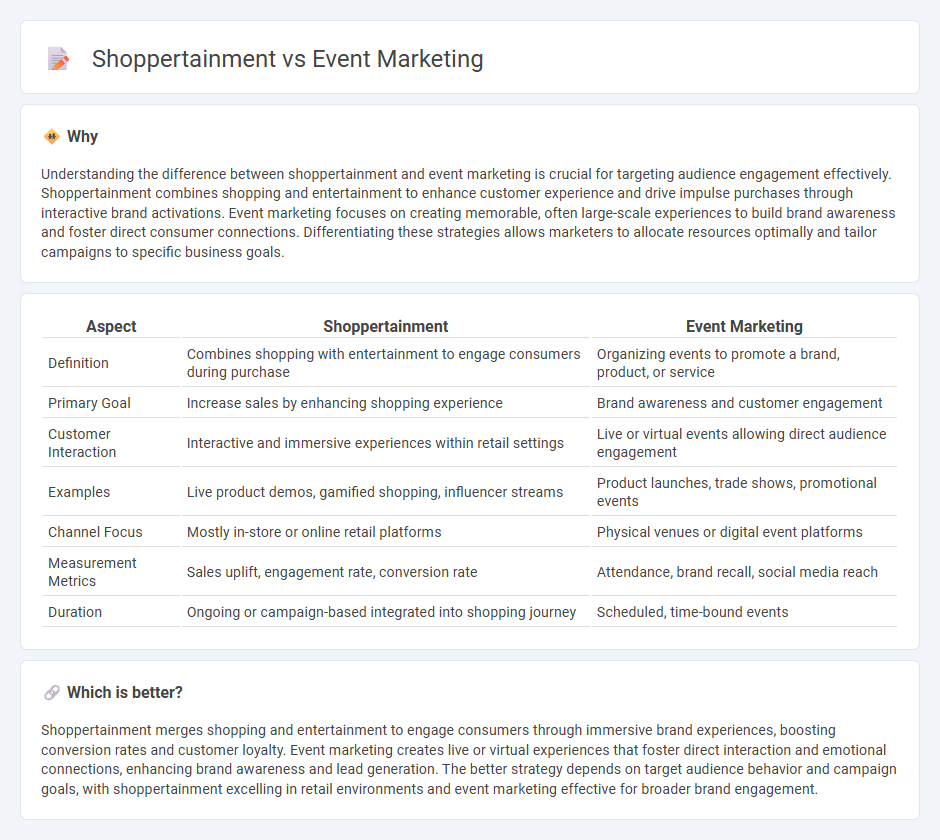
Shoppertainment blends shopping with entertainment, creating immersive brand experiences that actively engage consumers and boost purchase intent. Event marketing focuses on orchestrating live or virtual events to promote products, foster customer relationships, and generate leads through direct interaction. Discover how these dynamic strategies can elevate your brand presence and drive sales effectively.
Why it is important
Understanding the difference between shoppertainment and event marketing is crucial for targeting audience engagement effectively. Shoppertainment combines shopping and entertainment to enhance customer experience and drive impulse purchases through interactive brand activations. Event marketing focuses on creating memorable, often large-scale experiences to build brand awareness and foster direct consumer connections. Differentiating these strategies allows marketers to allocate resources optimally and tailor campaigns to specific business goals.
Comparison Table
| Aspect | Shoppertainment | Event Marketing |
|---|---|---|
| Definition | Combines shopping with entertainment to engage consumers during purchase | Organizing events to promote a brand, product, or service |
| Primary Goal | Increase sales by enhancing shopping experience | Brand awareness and customer engagement |
| Customer Interaction | Interactive and immersive experiences within retail settings | Live or virtual events allowing direct audience engagement |
| Examples | Live product demos, gamified shopping, influencer streams | Product launches, trade shows, promotional events |
| Channel Focus | Mostly in-store or online retail platforms | Physical venues or digital event platforms |
| Measurement Metrics | Sales uplift, engagement rate, conversion rate | Attendance, brand recall, social media reach |
| Duration | Ongoing or campaign-based integrated into shopping journey | Scheduled, time-bound events |
Which is better?
Shoppertainment merges shopping and entertainment to engage consumers through immersive brand experiences, boosting conversion rates and customer loyalty. Event marketing creates live or virtual experiences that foster direct interaction and emotional connections, enhancing brand awareness and lead generation. The better strategy depends on target audience behavior and campaign goals, with shoppertainment excelling in retail environments and event marketing effective for broader brand engagement.
Connection
Shoppertainment merges shopping with entertainment to enhance consumer engagement, while Event Marketing leverages live or virtual events to create immersive brand experiences. Both strategies drive customer interaction and emotional connection by integrating entertainment elements directly into the purchasing journey. This synergy increases brand visibility, fosters loyalty, and boosts sales through memorable and engaging consumer experiences.
Key Terms
Engagement
Event marketing leverages live experiences to create direct interaction and emotional connection with the audience, driving brand awareness and loyalty. Shoppertainment combines entertainment elements within retail environments to captivate shoppers, enhancing engagement through immersive and interactive experiences. Explore the unique strategies behind event marketing and shoppertainment to maximize customer engagement and boost sales.
Experience
Event marketing leverages live experiences to create emotional connections between brands and consumers, enhancing engagement through interactive activities and immersive environments. Shoppertainment combines entertainment with shopping, transforming retail spaces into dynamic venues that captivate customers and drive purchasing behavior by integrating performances, gamification, and social interaction. Discover how these strategies redefine consumer experience and boost brand loyalty.
Conversion
Event marketing captivates audiences through live experiences, generating emotional connections that boost brand loyalty and drive conversions. Shoppertainment combines entertainment with shopping, leveraging interactive content and gamification to engage consumers and accelerate purchase decisions. Explore how integrating these strategies can maximize conversion rates and enhance customer engagement.
Source and External Links
What is Event Marketing? Definition, Benefits, and ... | ActiveCampaign - Event marketing is a strategic approach involving the creation and execution of an event to promote a product, service, or brand, enhancing engagement through in-person, virtual, or hybrid formats and enabling networking, lead generation, and brand loyalty-building opportunities.
What is Event Marketing: Key Concepts, Proven Strategies ... - Eventtia - Event marketing helps businesses grow by connecting with audiences through memorable live or virtual experiences such as conferences or workshops that build trust, excitement, and deeper understanding of products or services.
Event Marketing: How to Build Your Strategy & Connect With ... - Event marketing encompasses various formats like conferences, trade shows, and expos, aiming to promote brands and products effectively by providing education, networking, and engaging experiences targeted at both B2B and B2C audiences.
 dowidth.com
dowidth.com